Kristen Fraser, Scotland’s first female professional boxer, talks to @JanetChristie2 about her fight for equality
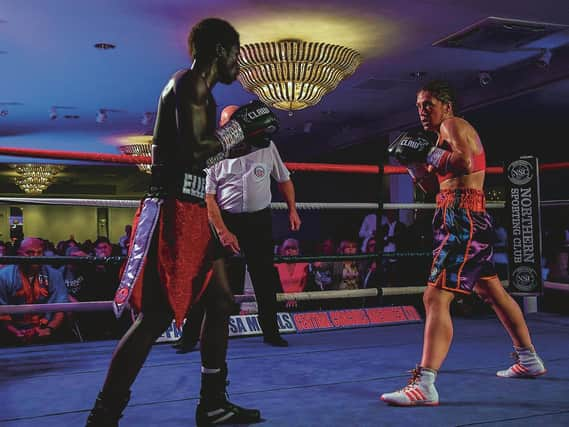

'Don’t have perceptions in your head about what women do or men do, just go and do what you want'
The Boxer
It’s only a matter of time before Kristen and Kirsty Fraser’s one-year-old daughter Robyn can stretch up high enough to grab that very shiny, fascinating thing that’s being kept out of reach at their Aberdeen home, when no longer distracted by Lego, she finally gets her hands on her mother’s gleaming boxing Commonwealth female bantamweight championship title belt.
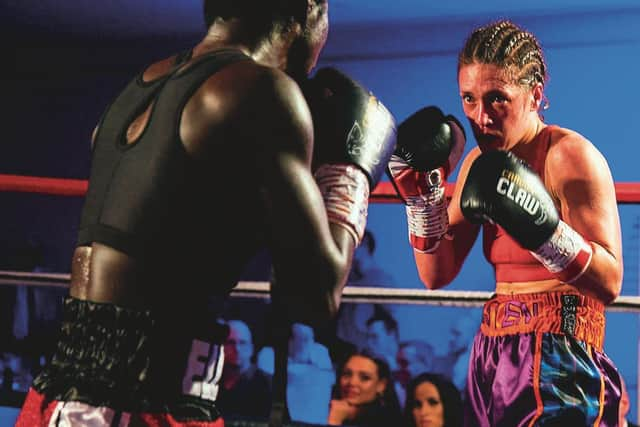

“Nope, it will be moved the minute she can reach it,” says Fraser, a 32-year-old economics graduate, technical integrity manager in the oil and gas industry, oh and when she’s not busy doing any of those things, she’s Scotland’s first female professional boxer, Commonwealth female bantamweight champion and is currently working on the world championship title.
Over the phone from lockdown the affable Fraser is talking about being the subject of a BBC Scotland hour-long documentary, The Boxer, out now on iPlayer. It was made by Alex Harron who became a fly-on-the-walls of the gym, dressing room and family home to follow Fraser’s journey to become Scotland’s first ever female Commonwealth title holder and beyond. From October 2018, we see the unbeaten professional, coached by David McAllister Junior of Northern Sporting Club in the Granite City, winning the Commonwealth title in Aberdeen by beating Malawi’s Ellen Simwaka, becoming a mother along with her wife Kirsty to baby Robyn in 2019 and fighting back against injury to bid for the world title. Which is when Covid-19 delivers the sucker punch that puts everything on hold, for now.
However, Fraser is someone who when she sees a barrier in front of her, likes to fight her way through, then encourage others to follow. She’s quietly spoken, yet sure of what she’s saying and if you don’t like the fact she’s a female boxer, gay, a Christian, supports women’s, LBGTI and Black rights, well, what are you going to do about it?
She’s also a bit of an economics geek, (obviously I didn’t call her that to her face, even over the phone) with a thing for the analytics and predictive side of the subject, “modelling that is really relevant now with coronavirus going on,” she says, before recommending I read the “fantastic” Freakonomics.
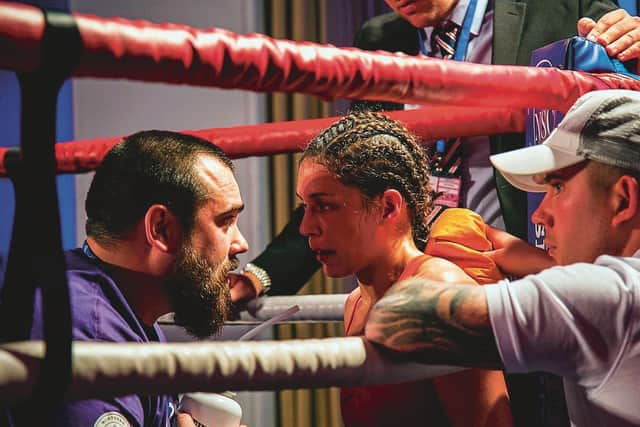

Outside the ring there’s nothing aggressive about Fraser, in fact she couldn’t be nicer, chatting away about babies, lockdown, childcare and the church she goes to with her wife, her job in the oil and gas industry, as well as boxing, and you almost forget the unbeaten fighter could knock you into next week. Until we’re back talking fighting and she mentions “punching the s**t” out of someone in the ring. Or when she casually mentions doing 100 press ups. That’s 100, in one training session.
As she explains, “outside the ring boxers are some of the loveliest people you could ever meet, but once you’re in that zone, once that switch goes and it’s the fight, the reflexes are there, the action’s there, the desire’s there. You’re not going to apologise for hitting someone straight in the face.”
The fight to the top
Born and raised in Aberdeen, Fraser comes from a family that loves boxing and was always watching it on TV and she and her sister “used to batter each other all the time”, despite their parents buying them a punch bag. Without any female boxers to watch, Fraser’s heroes were all male, especially the big hitting Brits who punched above their weight on the world stage.
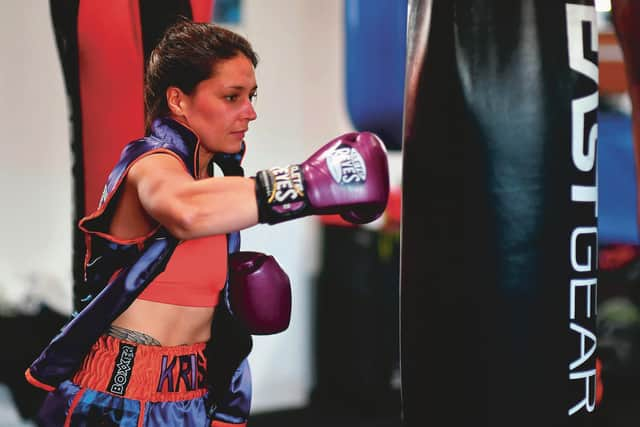

“The first fight I can remember seeing was Mike Tyson, and I thought that guy is an absolute monster – how strong and fit and powerful he was. Ricky Hatton was the one I wanted to be like; so entertaining, his stamina and power and you could see his passion when he fought. For all the size of him, my goodness such a powerhouse. And I liked Prince Naseem, Lennox Lewis, big British names. We’re very lucky in that we’ve always had a strong boxing history that rivals the US, strangely enough given our size.”
But no women.
“No women.”
Until Fraser, who after taking up Muay Thai at 15 went on to join a boxing gym.
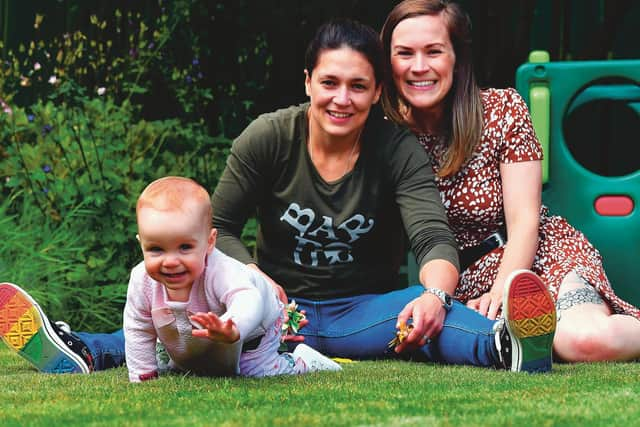

“At that time, there weren’t really women in the gym. Now there are three of us that are national champions, and probably six to ten at the gym, getting younger as well.”
And how many men?
“Loads!”
Title fighter
From the age of 18 she was winning national and international amateur championships and was assured that winning a Scottish title and an international tournament would win her a place on the Scottish Commonwealth Games team in Glasgow 2014. But her hopes were dashed when the Scottish Boxing Association sent 16 males and no female boxers.
“It was a horrible, horrible experience. Without being individualistic; they didn’t include any women in the team. They did at one point say it’s because the women would get hurt,” she says and laughs.
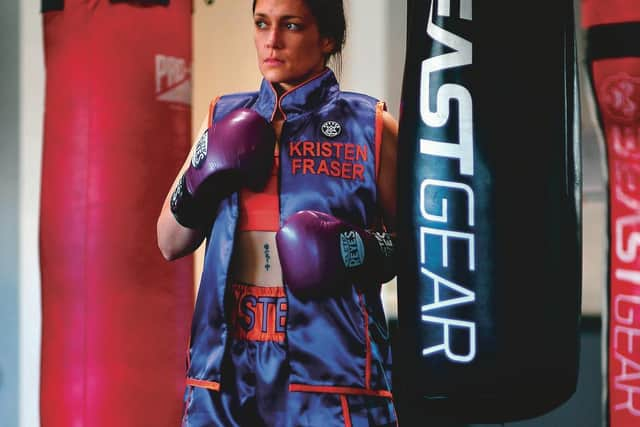

Presumably the men wouldn’t be hurt in any way?
“Obviously not, no, they’re superhuman.” She laughs again. “I try not to be bitter about it because it was so long ago, but it was disappointing.”
Disillusioned Fraser almost gave up the sport, her dream of fighting for her country shattered.
A professional approach
“I actually enjoyed boxing amateur, but when you train and train and other people make decisions for you based on stuff they’re not transparent about, it’s very difficult to keep yourself motivated and I thought, ‘I just don’t want to do this any more’. But I have a very long and trusted relationship with my coach Davie and we said ‘well, let’s just take matters into our own hands’. It pushed me towards turning professional.”
And now Fraser is working on another dream: “I want to be world champion.”
Boxing's gender balance
Because she fights fair Fraser points out that amateur boxing is improving in terms of gender balance and things are now more positive for female boxers. “They’re doing more for women now, introducing proper funding and structure around how they’re trained and selected. But at the time I was boxing, those kind of things weren’t in place and that’s why I moved on.”
At 5ft 4 and with a fighting weight of 53kg Fraser isn’t fazed by sparring with men. As she points out, women come in all shapes and sizes too.
“I could have a female opponent who’s 5ft 11 so their style will be very different to mine. They could be more reach-y so you’re seeing across female boxers very different styles and there are different styles between different countries as well – Cuba, the US, the Eastern Europeans.
“Men’s stance is different and their arm reach is longer, and at the same weight they’re naturally a bit more powerful, that’s just physiological. It doesn’t deter me, that’s just a fact,” she says. Her biggest challenge isn’t sexism, it’s finding opponents.
“You have to go further afield than the men – South Africa, Malawi, Eastern Europe – and you need money and sponsorship to bring them here, all their travel expenses, wages, the fees associated with the board, all the paperwork. It’s a bit more complicated but I’m very lucky because Davie does all that,” she says and laughs.
Class coach
While Fraser doesn’t see any difference between male and female in terms of instinct and ambition, in the documentary McAllister, who has coached her for 14 years and who has been with Fraser every step of the way, ventures the opinion that once a month, women boxers have mood swings. Does she agree?
She laughs.
“I can be a bit ratty at times, yes, but I don’t know if it’s anything to do with that, I think it’s just in general…”
Don’t male boxers sometimes have mood swings as well?
“Exactly. But there are things you have to consider when you’re dealing with female boxers. At some times in the month you will struggle to lose weight a bit more, so when Davie’s setting up fights, depending on the date I’m like ‘maybe you need to wait a week’. To have that conversation, you have to have trust there.”
Training track
In lockdown, Fraser has been sticking to her fitness regime and she’s delighted to recently be allowed back at the gym, although all at a social distance.
“It was just good to be back in that environment. To have something that’s so constant in such an ever changing environment. It’s secure. I’m just in the boxing club with my coach, with other professionals and that’s a really nice space, just because it’s always kind of been my happy place.
“I’m training just once a day to keep where I’m, maybe four or five weeks out of peak fitness. You don’t want to overdo it and be having an opportunity and you’re a bit tired. It’s nice to have space to do things I enjoy as well, training wise. There’s some stuff you just have to do that you hate…
Like what?
“I hate running with a passion.”
This is a surprise as the documentary shows her pounding the Granite City’s parks and streets like the athlete she is.
“I run so much and I just hate it,” she says again. “It’s kind of lonely isn’t it, running? An hour long run is OK once a week, but I do those three times a week. I really like doing sprints because it’s very engaging, constantly checking your heart rate, your watch. It might just be that I can’t concentrate for long,” she says.
“I love doing strength and conditioning and sparring’s my favourite because it’s so engaging and you have to be really reactive as well as practise all the things you need to.”
Once she’s focused and in the zone, whether in the gym or ring, Fraser forgets everything else.
“You just get lost in it. If you’ve had a difficult day at work or something is playing on your mind, going to the boxing gym you don’t have room for that. And if it’s still getting to you, you can beat s**t out of each other,” she says and laughs, “that’s a great stress relief”.
Oil industry day job
Fraser’s day job is as a technical integrity manager at Wood, which includes assessing equipment for pipelines and the oil industry.
“I’ve been there from being a graduate and really like it. I’ve been very fortunate in the difficult time that the industry faces to still be with a company that is genuinely a really good place to work.”
Does being a boxer help at all in an industry that’s often perceived as being male dominated?
“No, it doesn’t make any difference, but it’s a good party trick to talk about it,” she says. “Actually in the part of the business I’m in, it’s almost half and half male/female and more women are coming through university in the related subjects. It’s about encouraging girls at school, saying, well, you’re doing physics and chemistry… saying the perception that it’s a male dominated environment may be true, but actually it’s changing quite a lot.”
Fighting barriers
From boxing to the oil and gas industry to churches to family dynamics, times are changing and Fraser is big on telling people to go their own way, whatever that may be. Just because she likes boxing and going to church, she’s not telling other people they should.
“It’s not saying ‘come and do this’, it’s having no barriers, saying ‘go and do what you want to do. Don’t have perceptions in your head about what women do or men do, just go and do what you want’. I think that’s a really important thing to get across to anyone, boys, girls whatever, in all places in society. ‘Oh I can’t go to university…’ Why not? I hope time is changing things.”
Time doesn’t make a difference on its own however, it’s people like Fraser standing up and speaking out, or just being open about what they are and how they live their lives, in her case talking about being gay, being Christian, that brings about change.
“I think it’s really important to share, but inevitably you get backlash on things that you say.”
Are there ever times she regrets sticking her head up and speaking out?
“All the time!” she says, and laughs.
“But I try to reflect on equality for everyone. I just think that as a person I try to be open about accepting. Because being gay, you know if you look at the history of even the legality of it in Scotland, it’s only very recently that we could get married, only very recently that I could legally be a parent having not been the person who gave birth, and that’s progress. But at the same time conversion therapy is still legal in Britain for gay and transgender people, and that’s awful. And when you look at other movements like Black Lives Matter, you need to reflect on how you can support it, and be aware of all these barriers that are still facing people.”
Kristen's corner and being a mum
In the ring Fraser likes to be boss, but at home it’s much more of a partnership with teacher Kirsty, who she met in her first year at Aberdeen university and married in 2014.
“There’s only one boss in my house, a one-year-old girl. I’m just a marshmallow when I’m with her. ”
Since Robyn arrived last year Kristen and Kirsty’s relationship has inevitably evolved as she becomes their priority.
“Immediately everything switches round, your whole focus is on her. But we’ve got a good wee routine going now so Kirsty and I definitely have some more time together and we got a couple of nights out before coronavirus hit.
Having Robyn is great. I wouldn’t change it for the world.”
Given that she’s a soft touch around her daughter, how would she feel if she grew up wanting to follow her into the ring?
“Well, boxing’s very specific, but I would like her to do sport, because I think it teaches children a lot about getting stuff done and working through it. I don’t want to go into the gym and do 100 press ups – I’d rather do anything else – but sometimes you just have to or there are consequences and I think those lessons are important in life.
Win, win
“And sport’s given me a place I really enjoy being, a group of people I wouldn’t have met that I’ve grown really strong relationships with and provided me with lots of opportunities I would never have got had I not been involved in boxing.”
But athletes’ careers have a limited time span, as Fraser points out. “I’m 32, so I’m not kidding myself – 40-year-old bodies just don’t work the same way as 22-year-old bodies. But I’m clinging on just now,” she says, eager for lockdown to end so she can get back in the ring to fight for her world title dream.
“That’s my goal, and when I look at what I’m missing to actually go to the gym, that has to be the pay off for it all.”
The Boxer is available now on BBC iPlayer
xxxxxxxxxxxxxxxxxxxxx
A message from the Editor:
Thank you for reading this story on our website. While I have your attention, I also have an important request to make of you.
With the coronavirus lockdown having a major impact on many of our advertisers - and consequently the revenue we receive - we are more reliant than ever on you taking out a digital subscription.
Subscribe to scotsman.com and enjoy unlimited access to Scottish news and information online and on our app. With a digital subscription, you can read more than 5 articles, see fewer ads, enjoy faster load times, and get access to exclusive newsletters and content. Visit https://www.scotsman.com/subscriptions now to sign up.
Our journalism costs money and we rely on advertising, print and digital revenues to help to support them. By supporting us, we are able to support you in providing trusted, fact-checked content for this website.
Joy Yates
Editorial Director